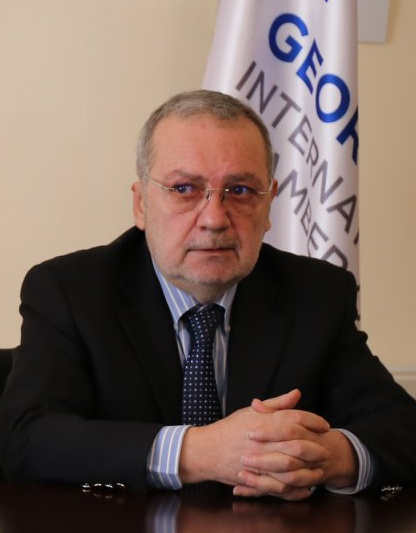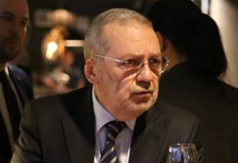interview
27.02.2019 (Caucasian Journal). Ambassador Zurab KATCHKATCHISHVILI, Secretary General of International Chamber of Commerce (ICC Georgia), has kindly agreed to give interview to Caucasian Journal.
Caucasian Journal: International Chamber of Commerce is the key partner of Caucasian Journal in Georgia. I take this opportunity to thank you for support, which
vividly demonstrates that ICC is more than an ordinary business association.
Since inception, ICC Georgia has been very attentive to the pace democratic
reforms and civil society formation. I would like to start with a specific
question. According to Economist’s 2018 Democracy Index, Georgia’s
position dropped from 78th to 89th place. How justified is this estimation, in
your view? If you agree with it, is this something that causes concern of ICC
and the business community?
Ambassador Zurab
KATCHKATCHISHVILI: In the
first place, let me congratulate you with the kick-off of Caucasian Journal and
express hope that it will successfully serve to faithfully depict and
analyze the political and economic environment in Georgia and the whole region.
As to your question – yes, we are deeply concerned by the deterioration of democratic development in the country. Even if we generally assess the business climate in the country, you know that for it to be progressing and attractive, democracy and full independence of governing bodies is essential. We are worried about the state of the Judiciary, which today is far from being independent and fair and, as you know, this is one of the main preconditions for attracting investors from abroad. So yes, ICC Georgia is anxious about how political life in the country affects business.
CJ: Despite this
sharp decrease of Georgia’s democracy rating, country’s position is still above
its neighbors – Armenia (103) and Azerbaijan (149). However, Armenia has
improved its rating by 8 points since previous year. If we extrapolate the
year’s trends into future, before too long Georgia and Armenia will have
identical indexes of democracy. What consequences this may have for the
regional business climate?
ZK: We can but
rejoice with the democratic advancement of our Armenian friends and neighbors.
Regional cooperation and stability can become a major tool for successful
economic development. On the other hand, what we today observe in Georgia
prompts us that if this tendency is not reversed in our country, the whole of
the region can be damaged. We definitely consider that the future of the three
Caucasian countries lies in common policies and joint efforts.
CJ: Let us look
at this from a broader perspective. I know that your organization pays serious attention to the civil society agenda and the democratic values, but what about
the average businesspeople? Is it true, that all that matters to entrepreneurs
is just stability?
ZK: Stability
is obviously an important component for a good business climate, but this is
not enough. A totally independent and competent Judiciary can also be
considered as one of the pillars for economic speedup, along with a special
attention given to foreign investments that are so much needed for Georgia. I
would say – stability is good and essential but not enough; anything that helps
strengthening democracy also contributes to business.
CJ: ICC unites
the largest Georgian as well and foreign companies and all your governing
bodies are international, comprising of both Georgians and expats. Many
foreigners coming from Western democracies occupy top executive positions and
can – in theory – assist in bringing the Western values to Georgia. How can you assess such influence? Do you observe any difference in attitudes
of Western executives vis-à-vis their local colleagues towards the civil
society agenda?
ZK: The input
of Western companies and businessmen is of course of crucial importance: along with modern technologies
and know-how they bring to our market, they also introduce and strengthen what I
would call universal values that are so important for maintaining and
developing a sound democratic atmosphere in the country.
CJ: We want to find the
most efficient ways of using the vast American and European civil society experience
to the advantage of our region’s peoples. You have been witnessing for a long
time the way foreign assistance has been implementing in Georgia. How effective
is it? Could you comment on the good and bad effects, or any concrete cases?
Perhaps you can name areas where the foreign experience might be especially
needed?
ZK: Many
foreign states and international bodies invest millions and millions in order
to support reforms in the country. They are targeting democratic institutions,
civil society and it should be noted that a huge progress has been achieved,
but more has to be done. But primarily, it is up to the Georgian nation itself
to make a fundamental choice: should we just remain a “post-Soviet” country, or
do we aim at becoming a member of the so-called Western civilization, making
ours values that will make Georgia a modern society with Rule of Law as our
main instrument for progress.There is
still much to be done, and help and support from Western countries in areas like
business regulations, norms and standards accepted widely, is very much
welcomed.
CJ: We have touched upon the democracy rating, but there another
controversial index I wanted to ask you about – the World Bank’s Dousing
Business. In contrast to Democracy
Index, Georgia’s rating has gone up – jumping 3 positions to 6th place in the
world. This is of course an outstanding achievement for a small post-Soviet
country, but how accurate is this assessment, in your view, and the World
Bank’s methodology in general?
ZK: The Doing
Business Index is quite tricky: is depicts the conditions under which you can
start and do business in a country, but in fact it does not reflect the reality
behind the legislation. We are of course delighted with Georgia’s progress in
that field, but reality prompts us to be very careful. So many of our member
companies had and still have problems with governmental bodies, without being
able to solve the disputes in a fair and just manner. So our view is that
methodology of the World Bank should be modified and brought closer to reality,
in order to give a brighter picture of the business environment.
CJ: We at Caucasian Journal are hoping to create a useful and effective communication platform.
Can you name 1-3 top priority areas of your organization, where our involvement
could be especially effective?
"The most urgent matter is to free the Judiciary from political pressure,
get necessary tools for a civil society that would act as a whistleblower."
ZK: Our priority, as a business organization, has always been better business climate, so anything that contributes to it is important for us. I would underline, as I already mentioned it, that the most urgent matter is to free the Judiciary from any political pressure, get the necessary tools for a civil society that would act as a whistleblower whenever things go wrong, and last but not least – business should be free from any kind of pressure from the authorities side, which ultimately is the reflection of a healthy democratic society.
CJ: You have a distinguished diplomatic career, including an ambassador position in India. You know the famous Kipling’s line: “East is East, and West is West, and never the twain shall meet”. So my last question is more about your experiences in the Eastern and Western countries. There is interesting sociological data published recently by Pew Research Center, which includes Georgia and Armenia, putting them in comparison with the rest of Europe across many parameters. For example, while the survey shows that “Eastern Europeans are more likely to regard their culture as superior to others”, the highest percentage of such opinion was found in Greece (89%!), Georgia (85%), and Armenia (84%). The levels for Western Europe were vastly different, starting from just 20% in Spain. Other surveys also suggest a sharp division in views and mentality between the East and the West. Do you agree with this perception?
CJ: You have a distinguished diplomatic career, including an ambassador position in India. You know the famous Kipling’s line: “East is East, and West is West, and never the twain shall meet”. So my last question is more about your experiences in the Eastern and Western countries. There is interesting sociological data published recently by Pew Research Center, which includes Georgia and Armenia, putting them in comparison with the rest of Europe across many parameters. For example, while the survey shows that “Eastern Europeans are more likely to regard their culture as superior to others”, the highest percentage of such opinion was found in Greece (89%!), Georgia (85%), and Armenia (84%). The levels for Western Europe were vastly different, starting from just 20% in Spain. Other surveys also suggest a sharp division in views and mentality between the East and the West. Do you agree with this perception?





No comments:
Post a Comment